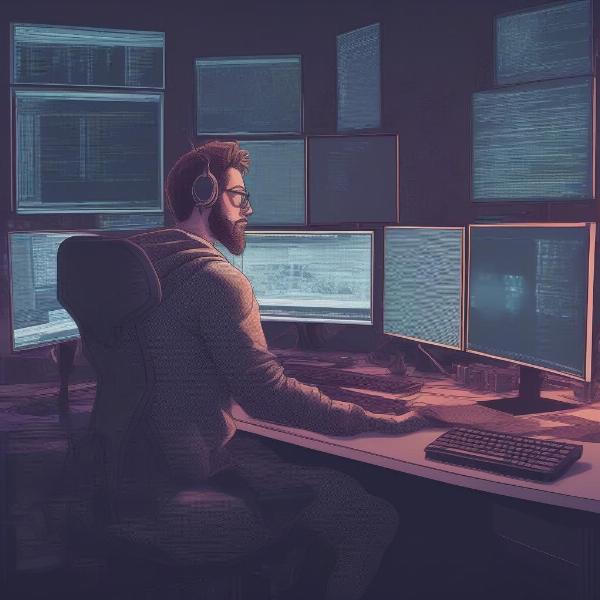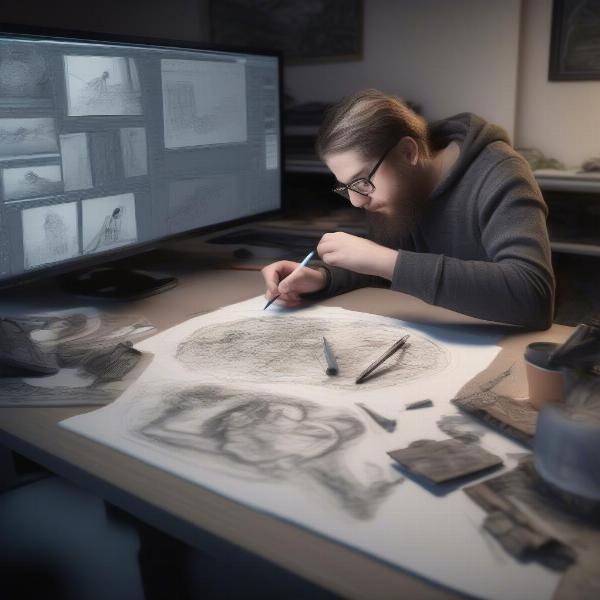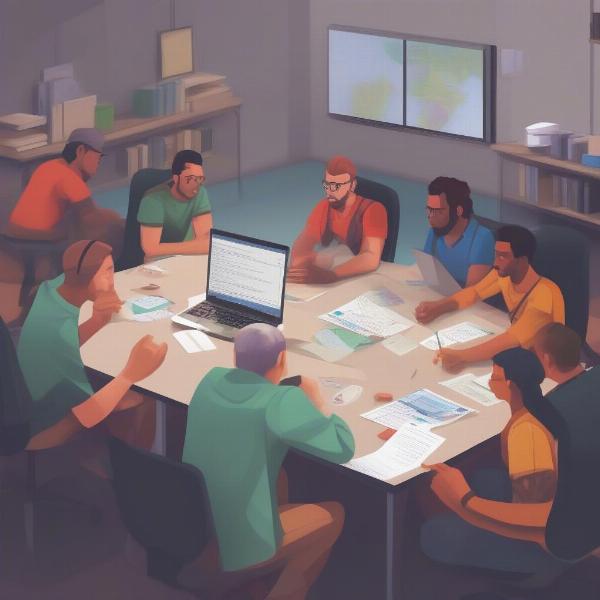The video game industry is booming, and with it, the demand for skilled video game developers is constantly growing. Ever wondered what it takes to join the ranks of these digital architects? This article will delve into the essential skills needed to be a video game developer, covering everything from technical prowess to creative flair.
Getting into video game development requires a multifaceted skill set. It’s not just about coding; it’s about bringing interactive worlds to life. Whether you’re aspiring to be a programmer, artist, designer, or any other role within a game development team, understanding the necessary skills is the first step towards your dream career. This isn’t a sprint; it’s a marathon, and persistence is key.
Programming Prowess: The Foundation of Game Development
Programming is the backbone of video game development. A solid grasp of programming languages like C++, C#, or Java is essential for translating game design concepts into functional reality. Think of it like constructing a building: the code is the framework that holds everything together. Without strong coding skills, even the most brilliant game ideas will remain just that – ideas. Different game engines may utilize different languages, so flexibility and a willingness to learn are crucial.
What languages should you focus on? C++ is often the go-to for high-performance games, while C# is popular for Unity development. Java, although less common, still finds its place in certain game development niches. But it’s not just about knowing the syntax. Understanding data structures, algorithms, and object-oriented programming is just as critical. These skills allow you to write efficient, maintainable, and scalable code, essential for complex game projects.
Beyond programming languages, scripting languages like Lua and Python are often used for in-game logic, AI, and other game mechanics. Learning these scripting languages can add another layer to your skill set, making you a more versatile developer. Aspiring developers often find it beneficial to focus on one core language initially before branching out to others.
 Video Game Developer Coding at Computer
Video Game Developer Coding at Computer
Artistic Vision: Breathing Life into Virtual Worlds
While programming forms the skeleton of a game, art brings it to life. Whether it’s 2D sprite art for a retro platformer or intricate 3D models for a sprawling open-world adventure, artistic talent is vital. Game artists are responsible for creating the visual elements that players interact with, from character designs and environments to user interfaces and special effects. A keen eye for detail, a strong understanding of color theory, and proficiency in digital art software are essential.
From conceptualizing characters to sculpting realistic environments, a video game artist uses a range of software and techniques to bring their vision to life. Popular software includes 3D modeling tools like Blender and Maya, 2D art software like Photoshop and GIMP, and texturing tools like Substance Painter. Proficiency in these tools, coupled with a strong artistic foundation, is essential for creating visually compelling game assets. Furthermore, knowledge of animation principles can bring those assets to life, adding another dimension to the game world.
Understanding game aesthetics is also important. Different genres require different art styles, and a successful game artist needs to adapt their approach accordingly. A cartoonish, vibrant style might suit a mobile puzzle game, while a realistic, gritty aesthetic might be more appropriate for a first-person shooter. This involves learning how to capture the game world’s ambiance through color, lighting, and composition choices, thereby enhancing the player experience. Thinking about user interface and user experience (UI/UX) is just as crucial as creating stunning visuals.
 Game Artist Creating 3D Model
Game Artist Creating 3D Model
Similar to how to learn game design, honing artistic skills requires dedication and practice. A strong portfolio showcasing your best work is crucial for landing a job in the competitive game development industry.
Design Expertise: Crafting Engaging Gameplay Experiences
Game designers are the architects of the virtual world, responsible for crafting the rules, mechanics, and overall gameplay experience. They conceptualize game levels, create compelling narratives, and balance gameplay elements to ensure a challenging yet rewarding experience for players. Creativity, problem-solving skills, and a deep understanding of game design principles are essential for this role.
A good game designer can see the bigger picture, understanding how individual game mechanics interact to create a cohesive and engaging experience. This requires not only creative vision but also a strong analytical mind. Balancing gameplay difficulty, designing rewarding progression systems, and creating compelling challenges are all part of the game designer’s toolkit. Moreover, they must be able to communicate their vision effectively to the rest of the development team, ensuring everyone is on the same page.
Game design also involves considering the target audience and platform. A mobile game designed for casual players will have different design considerations than a PC game aimed at hardcore gamers. Understanding the nuances of different platforms and player preferences is crucial for creating a successful game. Staying up-to-date with the latest game design trends and analyzing successful games can provide valuable insights.
To get a broader perspective on entering the game development world, you might find our article on how to get into video game development quite helpful. It offers valuable insights and practical tips for aspiring game developers.
The Power of Teamwork: Collaboration in Game Development
Video game development is rarely a solo endeavor. It’s a collaborative process involving programmers, artists, designers, sound engineers, and many other specialists. Effective communication, teamwork, and the ability to work within a team are essential for success. Being able to give and receive constructive feedback is also crucial for improving the overall quality of the game.
Open communication channels are vital within a game development team. Regular meetings, clear communication of tasks and deadlines, and a shared understanding of the project goals are essential for keeping development on track. Conflict resolution skills are also important, as disagreements are inevitable in any collaborative project. The ability to compromise and find solutions that benefit the entire team is a valuable asset.
Problem-Solving Abilities: Overcoming Development Hurdles
Game development is filled with challenges. From technical glitches and design flaws to creative roadblocks and production delays, developers constantly face obstacles. Strong problem-solving skills, the ability to think critically, and a persistent attitude are crucial for overcoming these hurdles. Debugging code, finding creative solutions to design problems, and troubleshooting technical issues are all part of a day’s work.
A resourceful developer can find solutions even when faced with limited resources or tight deadlines. This often involves researching online forums, consulting with other developers, and experimenting with different approaches until a solution is found. The ability to adapt to changing circumstances and learn from mistakes is essential for thriving in the dynamic world of game development. Don’t be afraid to seek help from others and share your knowledge with your team.
 Game Development Team Meeting
Game Development Team Meeting
Similar to navigating the complexities of how to be a big games partner, the ability to adapt and strategize is critical for success in game development.
What Programming Languages Are Most Used in Game Development?
While several languages are used in game development, C++, C#, and Java are among the most common. C++ is favored for its performance, allowing developers to create demanding games. C# is widely used with the Unity engine, enabling rapid prototyping and cross-platform development. Java, while less prevalent than C++ and C#, remains relevant for specific game genres and platforms.
How Important is Creativity in Video Game Development?
Creativity is paramount in game development. It drives innovative game mechanics, compelling narratives, and engaging world-building. Whether you’re a programmer devising elegant code solutions or an artist crafting breathtaking visuals, a creative spark can elevate a game from good to exceptional.
What Are the Key Responsibilities of a Game Designer?
A game designer’s responsibilities include conceptualizing game mechanics, designing levels, crafting narratives, balancing gameplay, and ensuring a cohesive player experience. They are the architects of the game world, shaping the rules and challenges players encounter. This often involves collaboration with other team members to bring their vision to life.
Is a Degree Necessary for a Career in Game Development?
While a degree can provide a structured learning path and valuable networking opportunities, it’s not strictly necessary for a career in game development. Many successful developers are self-taught, gaining skills through online courses, personal projects, and active participation in the game development community. A strong portfolio demonstrating your abilities can often outweigh formal qualifications.
How Can I Improve My Game Development Skills?
Continuous learning is key to improving your game development skills. Explore online resources, participate in game jams, contribute to open-source projects, and experiment with different game engines and tools. Building a portfolio of personal projects is a great way to showcase your abilities and gain practical experience.
Conclusion: Embarking on Your Game Development Journey
So, What Skills Are Needed To Be A Video Game Developer? It’s a blend of technical expertise, artistic vision, design thinking, teamwork, and problem-solving abilities. Entering this exciting field requires dedication, passion, and a constant desire to learn and grow. Whether you dream of coding complex game systems, designing immersive worlds, or creating stunning visuals, the path to becoming a video game developer starts with honing your skills and embracing the collaborative spirit of game creation. While the journey may be challenging, the rewards of bringing your game ideas to life are immeasurable.

